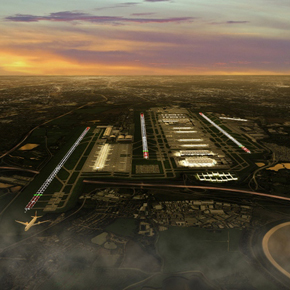
Gambling our future on airport expansion
Guest blog: Professor Alice Larkin, Tyndall Centre for Climate Change Research, School of Mechanical, Aerospace and Civil Engineering, University of Manchester.
The Paris Agreement is due to come into force on 4th November 2016, with a new ambitious goal of “holding the increase in the global average temperature to well below 2°C above pre-industrial levels and pursuing efforts to limit the temperature increase to 1.5°C …”.
 The nuanced language of “well below” accompanying the 2°C goal identifies strengthened ambition, and deserves a high profile. It defines a more constrained available carbon budget, than previous Accords and Protocols.
The nuanced language of “well below” accompanying the 2°C goal identifies strengthened ambition, and deserves a high profile. It defines a more constrained available carbon budget, than previous Accords and Protocols.
So what is the importance of the Paris Agreement’s new goals for airport expansion? Well once a constrained carbon budget is defined, modellers can develop a variety of future scenarios for global energy systems that remain ‘in budget’.
These would include obvious elements such as an increase in renewable and very low carbon energy supply-side options and big changes to the levels and patterns of energy use, storage, and energy efficiency.
However, studies almost universally also include highly optimistic assumptions about a new suite of ‘negative emissions technologies’ (NETs) offering a ‘carbon sink’ to balance carbon sources in the second half of the century.
This balancing is considered necessary from a mathematical perspective because some sectors are assumed to be too difficult to decarbonise in an appropriate timescale – air travel is one such sector. Yet recent attention drawn to a huge reliance on NETs highlights the significant risks posed assuming these interventions can be deployed at the necessary rate and scale. 
Aircraft are extremely difficult to decarbonise, which is why research illustrates that demand-side measures have a key role to play in minimising aviation CO2. If NETs prove to offer only marginal cuts to CO2 in future, the damage will have been done.
Short-term measures to tackle rising CO2 through minimising the demand for fossil fuels now are essential. A moratorium on airport expansion is one such mechanism, yet the opposite decision has just been made in relation to Heathrow expansion.
The consequences of which will have global ramifications in the short-term, enduring well beyond our lifetimes.
Latest news

19th April 2024
ASSA ABLOY: Access solutions can impact sustainability performance across the full life-cycle of a building
Embedding sustainability within any organisation requires a broad, strategic perspective. Scrutiny should include the physical infrastructure itself: According to the IEA, buildings consume around 30% of global energy*. ASSA ABLOY has more…
Posted in Access Control & Door Entry Systems, Architectural Ironmongery, Articles, Building Industry News, Building Products & Structures, Building Regulations & Accreditations, Building Services, Case Studies, Doors, Facility Management & Building Services, Information Technology, Research & Materials Testing, Retrofit & Renovation, Security and Fire Protection, Sustainability & Energy Efficiency, Video of the Week
19th April 2024
British weather doesn't dampen spirit for new HMG Garden Paint
Despite one of the wettest starts to the year on record, customers are starting to plan for brighter days with HydroPro Garden Paint from HMG Paints.
Posted in Articles, Building Industry News, Building Products & Structures, Garden, Innovations & New Products, Paints, Paints, Coatings & Finishes, Restoration & Refurbishment, Retrofit & Renovation, Site Preparation, Sustainability & Energy Efficiency, Waste Management & Recycling
18th April 2024
Abloy UK showcases new digital portfolio at The Security Event 2024
Abloy UK is set to unveil its latest line-up of access control systems at The Security Event 2024, welcoming guests to explore its cutting-edge electromechanical and digital solutions on stand 5/F50.
Posted in Access Control & Door Entry Systems, Architectural Ironmongery, Articles, Building Industry Events, Building Industry News, Building Products & Structures, Building Services, Doors, Exhibitions and Conferences, Facility Management & Building Services, Health & Safety, Information Technology, Retrofit & Renovation, Security and Fire Protection
18th April 2024
Strand is a Failsafe Choice for Emergency Exit and Panic Hardware
In times of emergency, you’re in safe hands with Strand Hardware. Although there are many considerations for building specification, few decisions can be as critical as selecting the right emergency exit/panic hardware.
Posted in Access Control & Door Entry Systems, Architectural Ironmongery, Articles, Building Industry News, Building Products & Structures, Building Services, Doors, Facility Management & Building Services, Health & Safety, Restoration & Refurbishment, Retrofit & Renovation, Security and Fire Protection
 Sign up:
Sign up: